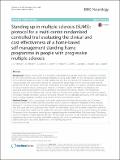Files in this item
Standing up in multiple sclerosis (SUMS) : protocol for a multi-centre randomised controlled trial evaluating the clinical and cost effectiveness of a home-based self-management standing frame programme in people with progressive multiple sclerosis
Item metadata
| dc.contributor.author | Freeman, J. A. | |
| dc.contributor.author | Hendrie, W. | |
| dc.contributor.author | Creanor, S. | |
| dc.contributor.author | Jarrett, L. | |
| dc.contributor.author | Barton, A. | |
| dc.contributor.author | Green, C. | |
| dc.contributor.author | Marsden, J. | |
| dc.contributor.author | Rogers, E. | |
| dc.contributor.author | Zajicek, J. | |
| dc.date.accessioned | 2016-05-16T11:30:05Z | |
| dc.date.available | 2016-05-16T11:30:05Z | |
| dc.date.issued | 2016-05-05 | |
| dc.identifier | 242608505 | |
| dc.identifier | 8f2aaaf2-a92e-41b3-a1e9-7a1f1c242cf2 | |
| dc.identifier | 84965025933 | |
| dc.identifier | 000375767700001 | |
| dc.identifier.citation | Freeman , J A , Hendrie , W , Creanor , S , Jarrett , L , Barton , A , Green , C , Marsden , J , Rogers , E & Zajicek , J 2016 , ' Standing up in multiple sclerosis (SUMS) : protocol for a multi-centre randomised controlled trial evaluating the clinical and cost effectiveness of a home-based self-management standing frame programme in people with progressive multiple sclerosis ' , BMC Neurology , vol. 16 , 62 , pp. 1-10 . https://doi.org/10.1186/s12883-016-0581-8 | en |
| dc.identifier.issn | 1471-2377 | |
| dc.identifier.other | Bibtex: urn:989b778ec6635a9b35a217c0c836ed67 | |
| dc.identifier.other | ORCID: /0000-0003-3481-825X/work/64034736 | |
| dc.identifier.uri | https://hdl.handle.net/10023/8807 | |
| dc.description | This study is funded by the NIHR Research for Patient Benefit Programme (PB-PG-1013-32047), United Kingdom. | en |
| dc.description.abstract | BACKGROUND: Multiple sclerosis (MS) is an incurable, unpredictable but typically progressive neurological condition. It is the most common cause of neurological disability in young adults. Within 15 years of diagnosis, approximately 50 % of affected people are unable to walk unaided, and over time an estimated 25 % depend on a wheelchair. Typically, people with such limited mobility are excluded from clinical trials. Severely impaired people with MS spend much of their day sitting, often with limited ability to change position. In response, secondary complications can occur including: muscle wasting, pain, reduced skin integrity, spasms, limb stiffness, constipation, and associated psychosocial problems such as depression and lowered self-esteem. Effective self-management strategies, which can be implemented relatively easily and cheaply within people's homes, are needed to improve or maintain mobility and reduce sedentary behaviour. However this is challenging, particularly in the latter stages of disease. Regular supported standing using standing frames is one potential option. METHODS/DESIGN: SUMS is a pragmatic multi-centre randomised controlled trial evaluating use of Oswestry standing frames with blinded outcome assessment and full economic evaluation. Participants will be randomly allocated (1:1) to either a home-based, self-management standing programme (with advice and support) along with their usual care or to usual care alone. Those in the intervention group will be asked to stand for a minimum of 30 min three times weekly over 20 weeks. Each participant will be followed-up at 20 and 36 weeks post baseline. The primary clinical outcome is motor function, assessed using the Amended Motor Club Assessment. The primary economic endpoint is quality-adjusted life years. The secondary outcomes include measures of explanatory physical impairments, key clinical outcomes, and health–related quality of life. An embedded qualitative component will explore participant’s and carer’s experiences of the standing programme. DISCUSSION: This is the first large scale multi-centre trial to assess the clinical and cost effectiveness of a home based standing frame programme for people who are severely impaired by MS. If demonstrated to be effective and cost-effective, we will use this evidence to develop recommendations for a health service delivery model which could be implemented across the United Kingdom. | |
| dc.format.extent | 10 | |
| dc.format.extent | 1654653 | |
| dc.language.iso | eng | |
| dc.relation.ispartof | BMC Neurology | en |
| dc.subject | Progressive Multiple Sclerosis | en |
| dc.subject | Standing | en |
| dc.subject | Standing frame | en |
| dc.subject | Physiotherapy | en |
| dc.subject | Self-management | en |
| dc.subject | Cost effectiveness | en |
| dc.subject | Mobility | en |
| dc.subject | RC0321 Neuroscience. Biological psychiatry. Neuropsychiatry | en |
| dc.subject | NDAS | en |
| dc.subject.lcc | RC0321 | en |
| dc.title | Standing up in multiple sclerosis (SUMS) : protocol for a multi-centre randomised controlled trial evaluating the clinical and cost effectiveness of a home-based self-management standing frame programme in people with progressive multiple sclerosis | en |
| dc.type | Journal article | en |
| dc.contributor.institution | University of St Andrews. School of Medicine | en |
| dc.identifier.doi | 10.1186/s12883-016-0581-8 | |
| dc.description.status | Peer reviewed | en |
This item appears in the following Collection(s)
Items in the St Andrews Research Repository are protected by copyright, with all rights reserved, unless otherwise indicated.

